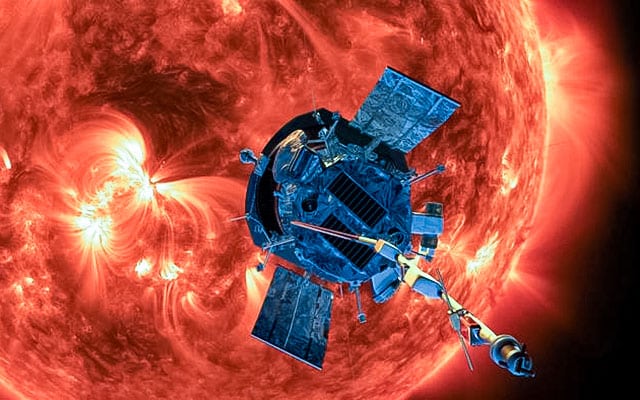San Francisco: NASA has launched a spacecraft as part of a mission in an effort to avert a potential “internet apocalypse” that could leave people without access to the internet for months.
According to Mirror, the US space agency’s Parker Solar Probe (PSP) has achieved a significant milestone by navigating through the solar wind.
Scientists have warned about the potential impact of an upcoming solar storm, commonly referred to as an “internet apocalypse”, which could strike within the next decade.
The spacecraft, which was launched in 2018, took a remarkable journey that brought it close to the sun’s surface, where the solar wind is generated.
Solar wind consists of a continuous stream of charged particles emanating from the sun’s outermost atmosphere, known as the corona, according to the report.
Despite the harsh conditions of intense heat and radiation, the Parker Solar Probe persevered in gathering vital information about the sun’s workings.
Professor Stuart Bale of the California University who served as the lead author of the study explained the significance of understanding solar wind.
“Winds carry lots of information from the sun to Earth. So understanding the mechanism behind the sun’s wind is important for practical reasons on Earth,” Bale was quoted as saying.
“That’s going to affect our ability to understand how the sun releases energy and drives geomagnetic storms — which are a threat to our communication networks,” he added.
Such an event could cause people to lose internet access for months or even years, rendering satellites and power lines useless.
Meanwhile, NASA has launched a new campaign offering the public the opportunity to have their name stencilled onto a microchip, which will ride aboard NASA’s Europa Clipper spacecraft next year.
Europa Clipper spacecraft is scheduled for journey to Jupiter and its moon Europa in October 2024.
Read more:
Data on UFOs fragmented, says NASA in first public meeting
NASA, MIT’s laser link achieves record-breaking 200-Gbps speed
SpaceX hires key NASA human spaceflight head for Starship
World sets eye on historic asteroid sample delivery by NASA
NASA’s Webb telescope reveals network of gas, dust in galaxies

















